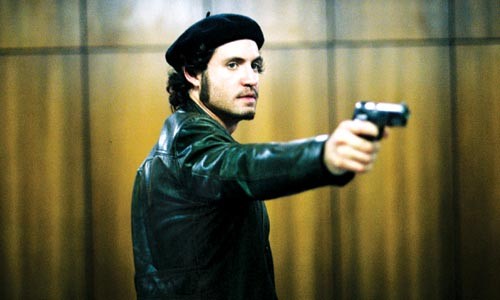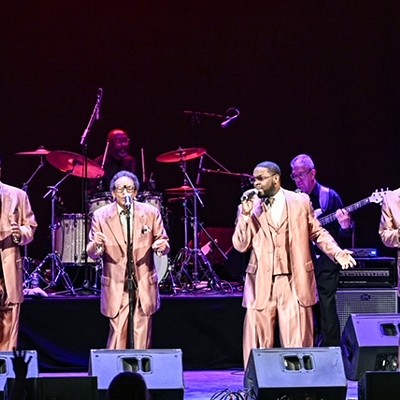If you've got six hours to kill this weekend, you could do worse than catching Olivier Assayas' Carlos, which screens twice in its entirety at the Oaks Theater, in Oakmont. The 320-minute bio-pic depicts two decades in the globe-trotting life of Venezuelan Ilich Ramírez Sánchez, a.k.a. Carlos or "Carlos the Jackal", one of the terrorist "superstars" of the late 20th century.
Part 1 of the film opens in 1973, in which Carlos' shadowy career is already underway. Working for the Popular Front for the Liberation of Palestine, Carlos participates in attacking various targets associated with Israel, including individuals, newspapers and a bank. (Most astonishing for today's air travelers is a rocket assault on El Al planes staged at France's Orly Airport.)
When not blowing stuff up, Carlos lounges in wine bars pontificating about Che Guevara, beds a series of dark-haired beauties and dreams of assembling an international army to fight imperialism. Then, in 1975, things go wrong in Paris, and Carlos flees for the safety of Yemen.
There, the PFLP assigns him to a spectacular new attack, an action within an action, the execution of which takes up most of Part 2. During an OPEC ministers' conference in Vienna, Carlos' group (which now includes a German terrorist) will take the ministers hostage in the name of Palestinian liberation. But secretly, geopolitics and Iraqi influence is driving this mission -- and the action, while something of a success, becomes a backroom-diplomacy debacle that Carlos can't control.
Part 3 finds Carlos losing his mooring. He's booted from the PFLP and bounces between Eastern Europe and various Mid-East countries, his personal and professional life becoming increasingly troublesome.
Indeed, students of history will mark that the while Carlos' power is ultimately undermined by the usual factors -- arrests or deaths of key collaborators, a reckless playboy lifestyle and his overinflated sense of self -- his greatest enemy may have been rapidly changing geopolitics and economic realities. The Soviet Union collapses; power shifts in the Middle East; and, in a world united by interlocking economies, there are few isolated spots willing to harbor a self-styled global terrorist.
Co-written by Assayas and Dan Franck, Carlos cops upfront to recreating much of the film's detail from an admittedly gray history. But the tale remains interesting, if not particularly flashy, and its scope is impressive. Its events will be fresh for younger viewers -- who should be assured that the astonishing OPEC episode really did happen -- and a fleshed-out refresher for those of us old enough to wonder whatever happened to Carlos the Jackal.
Despite its length, Carlos never provides much background on how or why the man was radicalized (he simply mentions that his parents were Leninists). This makes Carlos more akin to a fictional movie character perpetually in action, and the film less than a thoughtful character study of a young man morphing from fighting oppression to a grizzled assassin-for-hire with considerably less noble ideals.
But Carlos is a must-see for students of terrorism docu-drama, a micro-genre that is always fascinating for the tension caused by the tricky balance of depicting characters who are both heroes and cold-blooded killers. (Such viewers will find some dovetailing with the recent The Baader-Meinhof Complex, as well as Terror's Advocate, a 2007 documentary about Carlos' lawyer, Jacques Vergès.) Certainly, Venezuelan actor Édgar Ramírez is compelling as Carlos, ably playing the terrorist over two decades (and deftly handling his fluency in several languages) without rendering him too romantic. The film is directed with a minimum of flash; Assayas only occasionally uses music to underscore scenes, and reaches mostly for early punk tunes.
This screening is close to the length of the original European version, which was a TV mini-series, and twice the length of a heavily edited "theatrical version." I watched this at home in one sitting and was rarely bored, despite the repetitive or superfluous nature of some scenes. The third part -- in which Carlos has trouble finding work, allies and safe haven -- is the least interesting. But I promise you it ends with a droll moment that somehow ties it all together.

In English, and various languages, with subtitles. Film will be screened in three parts, with brief intermissions. 1:30 p.m. Sat., Jan. 8, and 5:15 p.m. Sun., Jan. 9. Oaks















